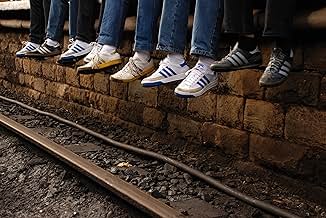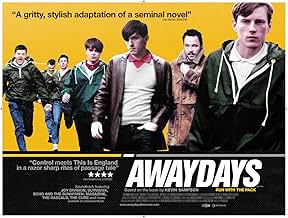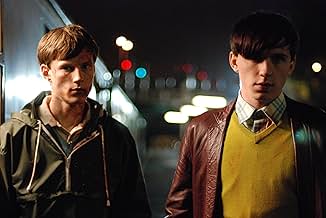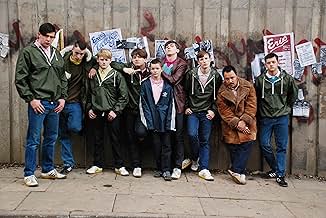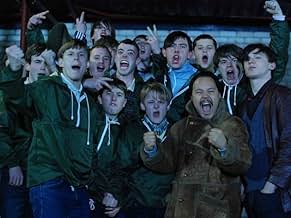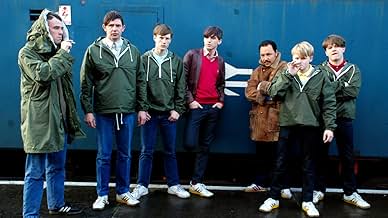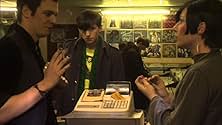NOTE IMDb
5,7/10
3,9 k
MA NOTE
Ajouter une intrigue dans votre langueIn the grim early years of Margaret Thatcher's premiership, also the crown years of hooliganism, the opportunities for thrill-seeking young men are what they've always been: sex, drugs, rock... Tout lireIn the grim early years of Margaret Thatcher's premiership, also the crown years of hooliganism, the opportunities for thrill-seeking young men are what they've always been: sex, drugs, rock n' roll, fashion, football and fighting.In the grim early years of Margaret Thatcher's premiership, also the crown years of hooliganism, the opportunities for thrill-seeking young men are what they've always been: sex, drugs, rock n' roll, fashion, football and fighting.
- Récompenses
- 1 victoire au total
Michael Ryan
- Marty
- (as Micheal Ryan)
Anthony Borrows
- Pee Wee
- (as Anthony Burrows)
Holliday Grainger
- Molly
- (as Holliday Granger)
Lianne Sorsa
- Suzy
- (as Lianna Sorza)
Dannielle Malone
- Janie
- (as Danielle Malone)
Avis à la une
The road to hell is paved with good intentions Carty.
The football hooligan movie! It's a genre of film in Britain that has proved to be a sound source for farming, be it the oldies like The Firm and I.D., or the spate of them that surfaced in the last decade such as The Football Factory, Green Street and Cass, films quenching the thirst for those who were either part of the scene, those who wish they were part of the scene, or merely for those interested in maybe learning about the subject to hand. There would have been many a football hooligan film fan who ventured into Awaydays and got torpedoed by what was on offer. For this is a different animal, a deep picture with heart and brains and as it turns out, it's the most misunderstood movie of the football hooligan splinter.
It's an everyday reminder of the absurdity of life.
Set in 1979 on The Wirral, Merseyside, film centres on the relationship between two lads, Carty (Bell) & Elvis (Boyle), who become great friends whilst running with The Pack, a small band of football hooligans who followed Tranmere Rovers. The Pack are different to other football mobs of the time, where the others were made up of boot boy skinheads and scarf wearing dockers, these lads wore casual sportswear, neat sweaters and sported wedge or fop haircuts. They also used Stanley Knives to maim their opponents in battle. What unfolds with the Carty & Elvis axis is that one of them, Carty, wants to be in with The Pack even though he's not sure why, while Elvis wants out but isn't sure how to achieve his goals. They both need each other, but for different reasons. It seems......
Welcome to the petite bourgeoisie.
Writer Sampson achieves a rare old thing in the genre, he manages to not glamorise the violence perpetrated by the football mob. He cloaks some of his characters in misery and others as sad misfits, and he perfectly understands that violence for these people is a drug, their unity is a need to belong, a means to escaping what they see as a void in their lives. With Carty and Elvis, they are from different backgrounds: Elvis lives alone in a gungey flat (nicknamed The Bat Cave), he's a tortured wastrel with a cynical outlook on life, Carty, recently rocked by the death of his Mother, still has a job with good wages, a father, a kid sister whom he adores and a clean family home. As Elvis tells Carty, almost bitingly, that he has it all and he doesn't belong with the people he so desperately wants to be with.
Hate the World it's so romantic.
It has been coined as the film that finds This is England meeting Control, and that is fair enough, though it's more of a burden since many observers accuse Awaydays of lacking freshness and not being worthy of mentioning with those two excellent movies. Yet Awaydays gets it mostly right, the period detail is spot on, and suitably grim as it turns out for a depressed Thatcher era backdrop. From old slam door trains and vinyl selling record shops, to the apparel sported by the old football gangs and the new casual look of The Pack, Sampson clearly knows his onions. One criticism I saw laughed that the youngsters of The Pack were fighting grown men, how it looked ridiculous, but that's exactly what it was, out with the old and in with the new. 1979 marked the crossover from the boot boy scarf wearing thug to the young "dressers" that would become infamous as football warfare reached a front page news zenith in the 1980s. The film may ultimately be about an unorthodox "bromance", with thematics of alienation, grief, family and addiction threaded deftly into the story, but it sure as hell knows the era as much as it does the characters.
Where will it end?
Which brings us to sound tracking and acting. The makers have fashioned a brilliant sound track that blends with each passage of play in the film; quite often marrying up to the character's emotional states. This is the post-punk era and that means Joy Division, John Foxx's Ultravox, Magazine, Echo & The Bunnymen and The Cure form the backbone of the soundtrack. All great bands and all purveyors of sadness, poetry and a veer from the norm. The acting away from Boyle (outstanding emotional layers) and Bell (wonderfully enigmatic) is a bit hit and miss, but such is the strength of the work by those two, film doesn't suffer. Stephen Graham is a darn fine actor, but nobody should be thinking he is stretching himself here, it's a role he could do in his sleep, but it always remains a well etched characterisation of an ex-squaddie who clearly can't let go of violence in his life. Oliver Lee is suitably menacing as the sadistic Baby Milan, and Grainger does well with a small female role in a film that uses the ladies perfunctorily. Must mention Mitchell's photography, which has moments of brilliance (check out the near water shots) that belie the low budget of the production.
Dislocation.
Some character motives are sketchy and Scouse accents are wayward at times, but this is an excellent film if you know what sort of film awaits you. It's a far cry from the chest thumping machismo of those films mentioned earlier, in that respect it's a failure. But as a character study, an examination of confused souls searching for something to bind their life to, and a observation of a young male friendship under unusual circumstances, Holden & Sampson's film is a near masterpiece. 9/10
The football hooligan movie! It's a genre of film in Britain that has proved to be a sound source for farming, be it the oldies like The Firm and I.D., or the spate of them that surfaced in the last decade such as The Football Factory, Green Street and Cass, films quenching the thirst for those who were either part of the scene, those who wish they were part of the scene, or merely for those interested in maybe learning about the subject to hand. There would have been many a football hooligan film fan who ventured into Awaydays and got torpedoed by what was on offer. For this is a different animal, a deep picture with heart and brains and as it turns out, it's the most misunderstood movie of the football hooligan splinter.
It's an everyday reminder of the absurdity of life.
Set in 1979 on The Wirral, Merseyside, film centres on the relationship between two lads, Carty (Bell) & Elvis (Boyle), who become great friends whilst running with The Pack, a small band of football hooligans who followed Tranmere Rovers. The Pack are different to other football mobs of the time, where the others were made up of boot boy skinheads and scarf wearing dockers, these lads wore casual sportswear, neat sweaters and sported wedge or fop haircuts. They also used Stanley Knives to maim their opponents in battle. What unfolds with the Carty & Elvis axis is that one of them, Carty, wants to be in with The Pack even though he's not sure why, while Elvis wants out but isn't sure how to achieve his goals. They both need each other, but for different reasons. It seems......
Welcome to the petite bourgeoisie.
Writer Sampson achieves a rare old thing in the genre, he manages to not glamorise the violence perpetrated by the football mob. He cloaks some of his characters in misery and others as sad misfits, and he perfectly understands that violence for these people is a drug, their unity is a need to belong, a means to escaping what they see as a void in their lives. With Carty and Elvis, they are from different backgrounds: Elvis lives alone in a gungey flat (nicknamed The Bat Cave), he's a tortured wastrel with a cynical outlook on life, Carty, recently rocked by the death of his Mother, still has a job with good wages, a father, a kid sister whom he adores and a clean family home. As Elvis tells Carty, almost bitingly, that he has it all and he doesn't belong with the people he so desperately wants to be with.
Hate the World it's so romantic.
It has been coined as the film that finds This is England meeting Control, and that is fair enough, though it's more of a burden since many observers accuse Awaydays of lacking freshness and not being worthy of mentioning with those two excellent movies. Yet Awaydays gets it mostly right, the period detail is spot on, and suitably grim as it turns out for a depressed Thatcher era backdrop. From old slam door trains and vinyl selling record shops, to the apparel sported by the old football gangs and the new casual look of The Pack, Sampson clearly knows his onions. One criticism I saw laughed that the youngsters of The Pack were fighting grown men, how it looked ridiculous, but that's exactly what it was, out with the old and in with the new. 1979 marked the crossover from the boot boy scarf wearing thug to the young "dressers" that would become infamous as football warfare reached a front page news zenith in the 1980s. The film may ultimately be about an unorthodox "bromance", with thematics of alienation, grief, family and addiction threaded deftly into the story, but it sure as hell knows the era as much as it does the characters.
Where will it end?
Which brings us to sound tracking and acting. The makers have fashioned a brilliant sound track that blends with each passage of play in the film; quite often marrying up to the character's emotional states. This is the post-punk era and that means Joy Division, John Foxx's Ultravox, Magazine, Echo & The Bunnymen and The Cure form the backbone of the soundtrack. All great bands and all purveyors of sadness, poetry and a veer from the norm. The acting away from Boyle (outstanding emotional layers) and Bell (wonderfully enigmatic) is a bit hit and miss, but such is the strength of the work by those two, film doesn't suffer. Stephen Graham is a darn fine actor, but nobody should be thinking he is stretching himself here, it's a role he could do in his sleep, but it always remains a well etched characterisation of an ex-squaddie who clearly can't let go of violence in his life. Oliver Lee is suitably menacing as the sadistic Baby Milan, and Grainger does well with a small female role in a film that uses the ladies perfunctorily. Must mention Mitchell's photography, which has moments of brilliance (check out the near water shots) that belie the low budget of the production.
Dislocation.
Some character motives are sketchy and Scouse accents are wayward at times, but this is an excellent film if you know what sort of film awaits you. It's a far cry from the chest thumping machismo of those films mentioned earlier, in that respect it's a failure. But as a character study, an examination of confused souls searching for something to bind their life to, and a observation of a young male friendship under unusual circumstances, Holden & Sampson's film is a near masterpiece. 9/10
STAR RATING: ***** Saturday Night **** Friday Night *** Friday Morning ** Sunday Night * Monday Morning
After the death of his mother, Paul (Nicky Bell) is looking for some direction in his life and thinks he's found it with 'the pack', a gang of football hooligans in late '70s Merseyside with a distinctive dress sense and tribal mentality. However, an encounter with former top boy Elvis (Liam Boyle) gives him an alternate view of them and the possibility of moving his life in a more positive direction. Elvis's dream is to escape to Berlin and lead a more fulfilling life and this is a direction Paul sees...but circumstances beyond his control drag him down with those around him and see his life thrown into chaos.
As morally dubious as they are, 'hooligan' films certainly have their own cult following in the UK, although this dramatization of a late 70s Merseyside gang has received limited exposure. It's an admirable piece, without any funding from any of the big London studios (ah), and it's not translated particularly badly into a film. But that doesn't mean it works.
The performances from the two lead actors are fine, as well as supporting actors such as man of the moment Stephen Graham in a smaller role, but who manages to have presence even with this. And it's an engaging piece of human drama, that manages to sweep you along with enough substance and depth to keep you hooked. But it's all lost on some weird art-house trip with itself, with slow, lingering close up shots of Boyle's bare chest and symbolism with red paint flowing between fingers representing blood, all done to a haunting Joy Division soundtrack. While it's stuck in this rut, the story becomes less engaging, the characters lose their depth and the film generally becomes a bit of a mess. Hardly a failure, but still a bit of a shame. **
After the death of his mother, Paul (Nicky Bell) is looking for some direction in his life and thinks he's found it with 'the pack', a gang of football hooligans in late '70s Merseyside with a distinctive dress sense and tribal mentality. However, an encounter with former top boy Elvis (Liam Boyle) gives him an alternate view of them and the possibility of moving his life in a more positive direction. Elvis's dream is to escape to Berlin and lead a more fulfilling life and this is a direction Paul sees...but circumstances beyond his control drag him down with those around him and see his life thrown into chaos.
As morally dubious as they are, 'hooligan' films certainly have their own cult following in the UK, although this dramatization of a late 70s Merseyside gang has received limited exposure. It's an admirable piece, without any funding from any of the big London studios (ah), and it's not translated particularly badly into a film. But that doesn't mean it works.
The performances from the two lead actors are fine, as well as supporting actors such as man of the moment Stephen Graham in a smaller role, but who manages to have presence even with this. And it's an engaging piece of human drama, that manages to sweep you along with enough substance and depth to keep you hooked. But it's all lost on some weird art-house trip with itself, with slow, lingering close up shots of Boyle's bare chest and symbolism with red paint flowing between fingers representing blood, all done to a haunting Joy Division soundtrack. While it's stuck in this rut, the story becomes less engaging, the characters lose their depth and the film generally becomes a bit of a mess. Hardly a failure, but still a bit of a shame. **
Having read Kevin Sampson's thoughtful novel the screen version is something of a disappointment. Characterisation and motivation are largely over-looked in favour of scenes of adrenaline-charged violence. The clothing and style of the era are meticulously created for "The pack" (the hooligan group that Carty joins) but you have to question why the people they fight are generally older less fashionably dressed groups. The pack also emerge from every fight with barely an injury. The music itself is good but often misused - is Joy Division's delicately mournful "The Eternal" really an appropriate soundtrack to a group of bovver boys snarling their way down the street? Shane Meadows "This is England" offers a far superior vision of the period.
Awaydays is a very misunderstood film in some respects. Had it been made in a time when we weren't already saturated with "football hooligan" films I genuinely believe it would've been much better received. Like Alan Clarke's 1988 "The Firm" which also uses football violence as a backdrop, Awaydays is much deeper than the likes of Football Factory. It's a story about two young lads both in that gap between being at school and entering the grown up real world if you like.
The two main characters are (I'm guessing) aged about 19 and both have dreams but neither has direction. What they have in common is they both want one another's life. It's almost tragic, because neither is going anywhere really.
After initially forming a close bond (and it's suggested that Elvis has romantic feelings towards Carty) their friendship soon starts to fall apart when the underlying reality that they are nothing alike surfaces. Neither are particularly likeable character's albeit in different ways. Elvis is probably the worse of the pair but has a very likeable side to him, he's the cool one of The Pack if you like, and the hooligan side of him is only one of a few personalities he seems to live.
Awaydays is gritty, and it's northern setting fits the story perfectly. I've read a lot of other reviews commenting on how fake the scouse accents are, but the film isn't set in Liverpool it's set on the Wirral, Birkenhead to be exact and I suppose given it's location it is a little like a Liverpool accent but slightly off if that makes sense?
Anyway, if you're expecting a football hooligan film you could be sorely disappointed. If you want to watch a decent coming of age drama with a great story I would highly recommend Awaydays.
The two main characters are (I'm guessing) aged about 19 and both have dreams but neither has direction. What they have in common is they both want one another's life. It's almost tragic, because neither is going anywhere really.
After initially forming a close bond (and it's suggested that Elvis has romantic feelings towards Carty) their friendship soon starts to fall apart when the underlying reality that they are nothing alike surfaces. Neither are particularly likeable character's albeit in different ways. Elvis is probably the worse of the pair but has a very likeable side to him, he's the cool one of The Pack if you like, and the hooligan side of him is only one of a few personalities he seems to live.
Awaydays is gritty, and it's northern setting fits the story perfectly. I've read a lot of other reviews commenting on how fake the scouse accents are, but the film isn't set in Liverpool it's set on the Wirral, Birkenhead to be exact and I suppose given it's location it is a little like a Liverpool accent but slightly off if that makes sense?
Anyway, if you're expecting a football hooligan film you could be sorely disappointed. If you want to watch a decent coming of age drama with a great story I would highly recommend Awaydays.
The year is 1978; the hippies have been replaced by the punk rockers, the depressive artists following acts like Lou Reed, Ultravox and Joy Division under the ever gloomy landscape of Margaret Thatcher's reformed Great Britain. For many it was a time to put your head down and get on with it, no matter how depressing it might have been—and then for other's it was more of an opportunity to let loose; to express the frustration built up inside by the disappointing anti-climax of the nineteen-sixties revolutions; their now forgotten refrain of "all you need is love" now replaced with council flats, minimum wage and a cheap night out at the pub to somehow make up for a day's soul-crushing monotony. Yeah, it wasn't a pretty time, and some people didn't necessarily want to make it any better. Nope, rather it was not uncommon for youngsters of the time who had nothing better to do (no jobs, no prospects, and no educational benefits) to indulge in past-times akin to pouring salt in a wound or prodding at a loose tooth just for the sake of reminding yourself of your dire situation. The country had a massive abscess, and rather than going to dentist to get it seen to, the youth would seek to the anger out through arbitrary fights with rival football fans, just for the sake of it. Sure, in retrospect it might seem a little melodramatic coming from a culture that produced the moody post-punk acts of the seventies, but Awaydays seeks to marry that sense of romance, with something a little more human too.
For the most part, director Pat Holden succeeds in bringing out the potency to Kevin Sampson's novel that strives to overcome the somewhat petty, pedestrian nature of this "football hooliganism" counter-culture. The movie's first act which focuses highly on the utterly detestable and seemingly unredeemable characters who would take part in these shallow acts of psychological transference, is unsurprisingly the weakest—but what comes after is something a little more enlightening and insightful. After spending a good half hour with these chaps that you'd probably find hanging outside your local cinema harassing customer's to buy them a "bevy from the offy", Holden takes some time away from the cliché elements of Sampson's novel (domestic quibbles and teenage angst) and brings the focus onto the budding friendship of its two central characters Elvis (Liam Boyle) and Paul Carty (Nicky Bell) who are more than just drunken thugs with zero prospects.
Carty is an art-school dropout who finds a lifestyle he is suddenly attracted to in the form of Elvis who is an aspiring, romantic artist who also dabbles in a bit of thuggery and drugs to make sure he's not perceived as a "total ****". Both share a common love of girls, popular, rebellious music and of course, football—or rather, beating up football fans. Unfortunately, going by scripture set in vinyl by their Godfather Ian Curtis while this common ground brings them together for short periods of time, it also tears them apart. From the offset, Carty comes off as a day-tripping tourist in search of a few months living like common people, and Elvis as an overly self-conscious sheep who is never quite sure of what he wants or how to get it—yeah, teenagers. This in turn with Holden's persistence that his feature be brimming and truthful with the emotional roller-coaster that was teenage life of the time is going to disgruntle viewers, but only because of the subject matter, rather than the way in which he portrays such subjects. Rather, taken from a distance, Awaydays is surprisingly reflective of those troublesome years, but never succumbs to the one-track mind-frame that dominates its central characters—these guys have more faults than virtues sure, but Holden makes sure to give them more than one dimension that is fleshed out after the first act into a dynamic that is thought-provoking and insightful enough to make you forget their misgivings.
What really helps to keep Awaydays afloat however are the performances of its central cast who, spearheaded by the charismatic and nuanced portrayals of Elvis and Carty, nail the humanist tones that echo throughout Sampson's story. So as the movie goes on, it gets to a certain point where you actually feel for these two guys and their situation—you may not like them, but they become more than just caricature thugs glorifying their right to expression by cutting up strangers' faces. Of course, there are still problems going into the film's closing stages which result largely from the melodrama associated with all this romantic tint put on the two character's plight, but when taken in context of Holden's otherwise extremely grim and bleak tale of late seventies street crime, such minor distractions fail to take any major precedence. The result is a surprisingly mature memoir of a time dominated by teenage angst and rebellion against a rather inhospitable society that—although flawed—works far more than it necessarily should.
For the most part, director Pat Holden succeeds in bringing out the potency to Kevin Sampson's novel that strives to overcome the somewhat petty, pedestrian nature of this "football hooliganism" counter-culture. The movie's first act which focuses highly on the utterly detestable and seemingly unredeemable characters who would take part in these shallow acts of psychological transference, is unsurprisingly the weakest—but what comes after is something a little more enlightening and insightful. After spending a good half hour with these chaps that you'd probably find hanging outside your local cinema harassing customer's to buy them a "bevy from the offy", Holden takes some time away from the cliché elements of Sampson's novel (domestic quibbles and teenage angst) and brings the focus onto the budding friendship of its two central characters Elvis (Liam Boyle) and Paul Carty (Nicky Bell) who are more than just drunken thugs with zero prospects.
Carty is an art-school dropout who finds a lifestyle he is suddenly attracted to in the form of Elvis who is an aspiring, romantic artist who also dabbles in a bit of thuggery and drugs to make sure he's not perceived as a "total ****". Both share a common love of girls, popular, rebellious music and of course, football—or rather, beating up football fans. Unfortunately, going by scripture set in vinyl by their Godfather Ian Curtis while this common ground brings them together for short periods of time, it also tears them apart. From the offset, Carty comes off as a day-tripping tourist in search of a few months living like common people, and Elvis as an overly self-conscious sheep who is never quite sure of what he wants or how to get it—yeah, teenagers. This in turn with Holden's persistence that his feature be brimming and truthful with the emotional roller-coaster that was teenage life of the time is going to disgruntle viewers, but only because of the subject matter, rather than the way in which he portrays such subjects. Rather, taken from a distance, Awaydays is surprisingly reflective of those troublesome years, but never succumbs to the one-track mind-frame that dominates its central characters—these guys have more faults than virtues sure, but Holden makes sure to give them more than one dimension that is fleshed out after the first act into a dynamic that is thought-provoking and insightful enough to make you forget their misgivings.
What really helps to keep Awaydays afloat however are the performances of its central cast who, spearheaded by the charismatic and nuanced portrayals of Elvis and Carty, nail the humanist tones that echo throughout Sampson's story. So as the movie goes on, it gets to a certain point where you actually feel for these two guys and their situation—you may not like them, but they become more than just caricature thugs glorifying their right to expression by cutting up strangers' faces. Of course, there are still problems going into the film's closing stages which result largely from the melodrama associated with all this romantic tint put on the two character's plight, but when taken in context of Holden's otherwise extremely grim and bleak tale of late seventies street crime, such minor distractions fail to take any major precedence. The result is a surprisingly mature memoir of a time dominated by teenage angst and rebellion against a rather inhospitable society that—although flawed—works far more than it necessarily should.
- A review by Jamie Robert Ward (http://www.invocus.net)
Le saviez-vous
- AnecdotesDuring one scene, Elvis talks about the idea of hanging himself whilst listening to "New Dawn Fades" by Joy Division. In 1980, Ian Curtis, the lead singer of Joy Division actually commited suicide the same way.
- GaffesThe "scouse" accents of nearly all the characters are clearly fake.
- Crédits fousThe credits thank "Nicola & Eddy at Camel Llairds". The correct spelling of this famous shipbuilder is "Cammell Laird"
- Bandes originalesNag Nag Nag
Written by Richard H. Kirk, Stephen Mallinder and Chris Watson
Performed by Cabaret Voltaire, bass & vocals Stephen Mallinder
Courtesy of Rough Trade Records
Meilleurs choix
Connectez-vous pour évaluer et suivre la liste de favoris afin de recevoir des recommandations personnalisées
- How long is Awaydays?Alimenté par Alexa
Détails
Box-office
- Montant brut mondial
- 131 265 $US
- Durée1 heure 45 minutes
- Couleur
Contribuer à cette page
Suggérer une modification ou ajouter du contenu manquant



